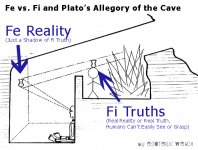i... am not a loyal person by nature. but don't get me wrong - i'm not a disloyal person by nature either. i'm just like... aloyal. to people, at least. the concept didn't really make sense to me for a long time, and it just isn't a frame of mind that i enter often. i have a hard time with conventional loyalty because a lot of it just really seems counterintuitive to me - blindly trusting someone, not speaking up when you feel like something is wrong, trusting a fallible human, etc. and shouldn't you just be generally nice to everyone, and not talk behind their backs as a baseline rule?
but anyway, what i just realized in writing this, is that i tend to be much, much more loyal to ideals than to people. i understand loyalty to ideals, but it really alters the way my personal sense of loyalty works - i'm very, very dedicated to certain groups, but my loyalty is more to the ideals of those groups than to the people themselves. i feel like people are flighty, changing, make questionable decisions, and are not always good. ideals, on the other hand, are stable and detached. they're timeless, infallible, and don't change their minds.and overall, i don't like being loyal to people because i end up being torn in two directions - either being loyal to them or loyal to my ideals. because when it comes down to that, my own ethics are going to win out.
my understanding of people-loyalty is less "devotion" or "consistency" and more "unconditional love". it's much less uncomfortable and much more intutitive in that light.
- what constitutes loyalty?
being willing to stick with something, or someone, especially despite potential negative impact on you.
- what is expected of those pledging loyalty?
equality. reciprocal loyalty.
- if someone displays disloyalty, what's the appropriate response?
depends on the situation. i think part of understanding loyalty as unconditional love is giving the other party the benefit of the doubt, and trying to assess what's going on, why it happened, etc. it's wanting to take care of the other person even though the situation is hurting you. that said, once they've broken the "contract", they've broken the contract. you have no responsibility to be loyal to them, even though it would probably be better to.
Tallulah said:
I'm not sure where loyalty even enters into the first case, [...] It sounds like it's more a matter of Fe language versus Fi language and being rubbed the wrong way.
yeah... though i mean, honestly, if i were the head of an NGO and had worked really hard on this program, and an aquaintance called me up telling me why it was such a bad idea, i would probably be unhappy too.
on the other hand, if EW feels similar to how i do about loyalty, then it would make sense that she was doing the best for The Cause, and it would be weird that he would get upset with her for trying to help The Cause. but if he thought, as Fe users tend to do, that the criticism was a reflection on him, and not the idea, then i can understand why such a thing happened.




